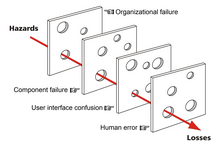Human Factors Analysis and Classification System
The Human Factors Analysis and Classification System (HFACS) identifies the human causes of an accident and offers tools for analysis as a way to plan preventive training.[1] It was developed by Dr. Scott Shappell of the Civil Aviation Medical Institute and Dr. Doug Wiegmann of the University of Illinois at Urbana-Campaign in response to a trend that showed some form of human error was a primary causal factor in 80% of all flight accidents in the Navy and Marine Corps.[1]
HFACS is based in the "Swiss cheese model" of human error[2] which looks at four levels of human failure, including unsafe acts, preconditions for unsafe acts, unsafe supervision, and organizational influences.[1] It is a comprehensive human error framework that folded James Reason's ideas into the applied setting, defining 19 causal categories within four levels of human failure.[3]

See also
[edit]- Accident classification
- Crew resource management
- National Fire Fighter Near-Miss Reporting System
- SHELL model
- Human reliability
References
[edit]- ^ a b c "The Human Factors Analysis and Classification System (HFACS),"Approach, July - August 2004. Accessed July 12, 2007. Archived February 8, 2007, at the Wayback Machine
- ^ Reason, J. [1990] Human Error. Cambridge University Press
- ^ HFACS Analysis of Military and Civilian Aviation Accidents: A North American Comparison. ISASI, 2004
